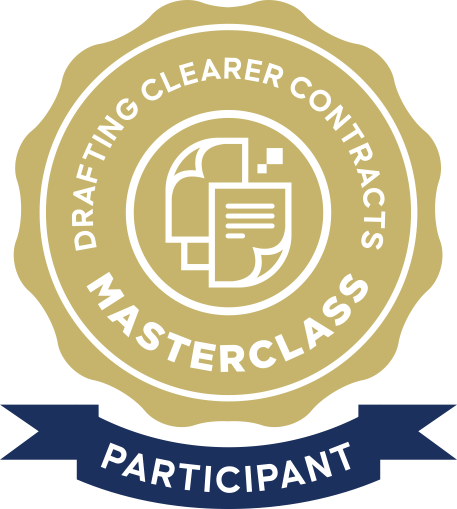Sporadically I get feedback from people who have taken my online course Drafting Clearer Contracts: Masterclass.
Today the professional-development person at a law firm said to me in an email, “We’ve signed up a few of our associates this year for your Masterclass sessions with great feedback.”
And here’s the review someone just posted:
This is a great class. It was truly a thoughtful discussion on how to write contracts better. You get what you put in, so you need to do the work and be engaged in the course. I have already recommended to others in the contract community.
But of particular interest was the account a participant just sent me, after I told them I’d like to hear what they thought of the course. In case anyone would find it helpful, here it is:
To answer your question, I’ve found the course to be very useful. To provide some background, I have no formal contract drafting training. Everything I know is what I’ve learned over the past decade or so through practice – initially while working as the sole legal counsel for a Hong Kong startup engaging in endless futile fundraising efforts (my first exposure to deal documents), and subsequently practicing “small law” in New York – primarily assisting European companies to enter/understand the U.S. market.
The takeaway from my Hong Kong experience was an overreliance on UK-style contract structure and a heavy overuse of defined terms. Much of my approach to contracts drafting/negotiation was (and remained for a long time) focused on making the language sound sufficiently “contractual”, which meant long run-away sentences peppered with defined terms and archaisms. It was around 2015 when I first had reason to delve into, and negotiate, large MSAs stateside (of the Salesforce variety – the one that really springs to mind was an overarching Accenture agreement), an exercise which first led me to your blog, in an effort to try to understand (and therefore negotiate) complex indemnification/limitation of liability language.
My default approach then became the following: tell the counterparty’s counsel outright when I didn’t understand what a clause meant, and ask them to kindly explain it to me. When they couldn’t, or made the meaning of an inscrutable clause sound obvious, I’d recommend that we redraft it so it’s understandable for both sides. This has tended to have a disarming effect and has generally rendered positive results. In one particularly egregious case, an indemnification clause appeared to require my client to indemnify the counterparty for the counterparty’s own intentional conduct. When I pointed this out to the counterparty’s counsel, I received an apology and an admission that this meaning wasn’t their intention and that at some point (who knows when), the language in their template had become muddled.
Since taking the class (and reading the book) I’ve been in a position to draft agreements from scratch for the first time, without working from a template. In one case, a client simultaneously asked me (on the US side) and their European counsel (for use in Europe) to draft an MSA for their business of providing event management services to large multinationals. The Europe-based firm finished first, and the client sent me their work product for comparison purposes. The contract they’d produced comprised five separate documents (containing both exhibits and schedules), with the main contract terms contained in a “T&C” dual-column appendix with size 8 font. This appendix was peppered with unsuitable boilerplate language (e.g. the confidentiality section referenced semiconductor topography), defined terms that required constant jumping back-and-forth, outright ambiguous wording, and plenty of throat clearing and muddled representations/warranties. I used my draft as an exercise to practice everything I’d learned in the class so far, and it was satisfying that it was well received by my client (and subsequently by the counterparty’s counsel when first used). I’ve also had some minor successes in using “states”, removing “hold harmless”, and rewording the various instances of “shall” and “may” while negotiating agreements.
I hope to see some of you in Masterclass!

